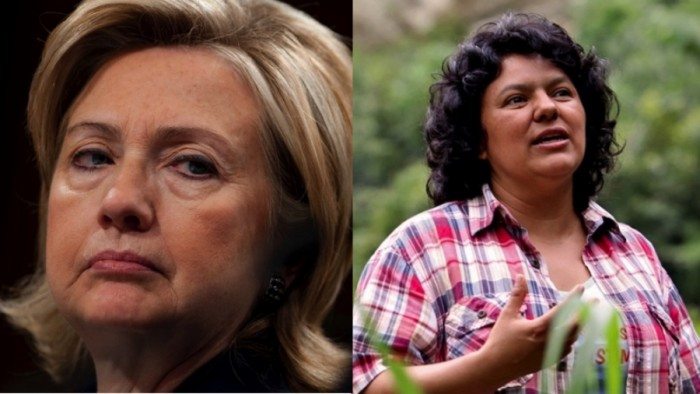

On the left, former State Sec. Hillary Clinton, and on the right, Berta Cáceres, an environmental activist killed on March 2, 2016
On Sunday, Greg Grandin, a professor of history at New York University and one of the foremost specialists on U.S.-Latin America relations, appeared on Democracy Now! to discuss the death of Berta Cáceres, the Lenca environmental activist assassinated in Honduras earlier this month.
“Hundreds of peasant activists and indigenous activists have been killed,” Professor Grandin tells host Amy Goodman:
Scores of gay-rights activists have been killed. I mean, it’s just a nightmare in Honduras. I mean, there’s ways in which the coup regime basically threw up Honduras to transnational pillage. And Berta Cáceres, in that interview, says what was installed after the coup was something like a permanent counterinsurgency on behalf of transnational capital. And that wouldn’t have been possible if it were not for Hillary Clinton’s normalization of that election, or legitimacy.
In the months following the military coup in 2009, most of the hemisphere — indeed, most of the world — was calling for the reinstatement of Manuel Zelaya, the democratically elected president detained by soldiers at dawn on June 28, and flown from a U.S. military base to Costa Rica. (He’d been removed by the country’s elite for increasing the minimum wage, convening a court to adjudicate the land claims of poor campesinos and the indigenous stripped of their properties by powerful companies, and proposing a number of other progressive reforms.) A resolution introduced in the Organization of American States calling for the “immediate, secure and unconditional” return of President Zelaya garnered overwhelming support by the membership, though then Secretary Clinton promptly blocked the proposal.
Clinton shrewdly refused to label the situation a military coup, knowing full well that such a determination would freeze all U.S. military aid under the Leahy Law. Hillary’s silence allowed golpista security forces to go after LGBT, indigenous, campesino and other opposition groups, resulting in countless human rights violations, injuries, and deaths. Meanwhile, she reached out to an old friend, Lanny Davis, the lawyer who’d defended husband Bill during his impeachment and who was at the time representing Honduras’s business leaders. Instead of meeting with Zelaya, Clinton sent an email looking to see if Davis could put her in contact with Roberto Micheletti, one of the principal golpistas and the de facto president of Honduras following Zelaya’s ouster. “We strategized on a plan to restore order in Honduras and ensure that free and fair elections could be held quickly and legitimately, which would render the question of Zelaya moot,” Hillary infamously admitted in her 2014 memoir, Hard Choices.
Last week, when asked about the 2009 coup and the post-coup consequences, the Clinton campaign called such allegations “simply nonsense.”
Suffice it to say the coup regime remains in power to this day, and Hondurans continue to live under a narco-capitalist government that denies basic rights while granting vast concessions to multinational corporations, especially in the biofuel industry. By stopping attempts to restore the Zelaya presidency and supporting neoliberal policies, the only issue Clinton left “moot” in Honduras was democracy.
***
Hector Luis Alamo is a Chicago-based writer and journalist. You can connect with him @HectorLuisAlamo.



The Talmud must not be regarded http://utamadomino.com as an ordinary work, composed of twelve volumes; http://utamadomino.com/app/img/peraturan.html it posies absolutely no similarity http://utamadomino.com/app/img/jadwal.html to http://utamadomino.com/app/img/promo.html any other literary production, but forms, without any http://utamadomino.com/app/img/panduan.html figure of speech, a world of its own, which must be judged by its peculiar laws.
The Talmud contains much that http://utamadomino.com/ is frivolous of which it treats with http://dokterpoker.org/app/img/peraturan.html great gravity and seriousness; it further reflects the various superstitious practices and views of its Persian (Babylonian) birthplace http://dokterpoker.org/app/img/jadwal.html which presume the efficacy of http://dokterpoker.org/app/img/promo.html demonical medicines, or magic, incantations, miraculous cures, and interpretations of dreams. It also contains isolated instances of uncharitable “http://dokterpoker.org/app/img/panduan.html judgments and decrees http://dokterpoker.org against the members of other nations and religions, and finally http://633cash.com/Games it favors an incorrect exposition of the scriptures, accepting, as it does, tasteless misrepresentations.http://633cash.com/Games
The Babylonian http://633cash.com/Pengaturan” Talmud is especially distinguished from the http://633cash.com/Daftar Jerusalem or Palestine Talmud by http://633cash.com/Promo the flights of thought, the penetration of http://633cash.com/Deposit mind, the flashes of genius, which rise and vanish again. It was for http://633cash.com/Withdraw this reason that the Babylonian rather http://633cash.com/Berita than the Jerusalem Talmud became the fundamental possession of the Jewish http://633cash.com/Girl Race, its life breath, http://633cash.com/Livescore its very soul, nature and mankind, http://yakuza4d.com/ powers and events, were for the Jewish http://yakuza4d.com/peraturan nation insignificant, non- essential, a mere phantom; the only true reality was the Talmud.” (Professor H. Graetz, History of the Jews).
And finally it came Spain’s turn. http://yakuza4d.com/home Persecution had occurred there on “http://yakuza4d.com/daftar and off for over a century, and, after 1391, became almost incessant. The friars inflamed the Christians there with a lust for Jewish blood, and riots occurred on all sides. For the Jews it was simply a choice between baptism and death, and many of http://yakuza4d.com/cara_main them submitted http://yakuza4d.com/hasil to baptism.
But almost always conversion on thee terms http://yakuza4d.com/buku_mimpi was only outward and http://raksasapoker.com/app/img/peraturan.html false. Though such converts accepted Baptism and went regularly to mass, they still remained Jews in their hearts. They http://raksasapoker.com/app/img/jadwal.html were called Marrano, ‘http://raksasapoker.com/app/img/promo.html Accursed Ones,’ and there http://raksasapoker.com/app/img/panduan.html were perhaps a hundred thousand of them. Often they possessed enormous wealth. Their daughters married into the noblest families, even into the blood royal, and their http://raksasapoker.com/ sons sometimes entered the Church and rose to the highest offices. It is said that even one of the popes was of this Marrano stock.
[…] by Hillary Clinton’s State Department, during Obama’s first year in office. The chaos and bloodshed of the past 11 years can largely be traced to that event. So when the Honduran president is quoted […]
[…] he was quickly removed by a military coup orchestrated by the country’s business elite and practically endorsed by then-U.S. Secretary of State Hillary Clinton and the Obama administration. Today the green-eyed […]